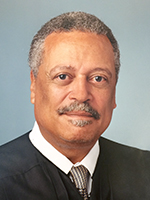Judge Emmet G. Sullivan
2015 Professionalism Award for the District of Columbia Circuit

 Judge Emmet G. Sullivan, of the U.S. District Court for the District of Columbia is so proud of having attended D.C. public schools that he mentions it in the first sentence of his official biography. Sullivan is both a product of and an influence upon District culture. Likely he inherited this strong sense of community from his parents. His father was a D.C. police officer, one of the force’s first minority lieutenants and a retiree after 30 years of service; and his mother was a D.C. government employee. Sullivan’s decision to apply for a position on the bench was driven by his deep connection to the area and a desire to give back. He is the only person in the District of Columbia to have been appointed by three U.S. presidents to three judicial positions.
Judge Emmet G. Sullivan, of the U.S. District Court for the District of Columbia is so proud of having attended D.C. public schools that he mentions it in the first sentence of his official biography. Sullivan is both a product of and an influence upon District culture. Likely he inherited this strong sense of community from his parents. His father was a D.C. police officer, one of the force’s first minority lieutenants and a retiree after 30 years of service; and his mother was a D.C. government employee. Sullivan’s decision to apply for a position on the bench was driven by his deep connection to the area and a desire to give back. He is the only person in the District of Columbia to have been appointed by three U.S. presidents to three judicial positions.
Sullivan attended Benjamin Banneker Middle School and McKinley High School and upon graduating, applied to Howard University—the only institution he considered. The Vietnam War was underway so Sullivan enrolled in the ROTC program. When he graduated from Howard, he had not planned his next step after fulfilling his military obligation. Sullivan’s father introduced him to some attorneys, and he became interested in the law as a tool to address social problems.
Upon entering Howard University School of Law, Sullivan found a significant emphasis on legal ethics and strong role models. Torts professor Patricia Roberts Harris would go on to become the first African American woman to represent the United States as an ambassador (Luxembourg), as well as to serve as U.S. Secretary of Housing and Urban Development and U.S. Secretary of Health, Education, and Welfare. She was the dean of the law school at the time and made a powerful impression on Sullivan, as did many other professors.
“Education in professionalism may not be mandatory but it should be,” says Sullivan. “Lawyers need to learn how to conduct themselves in and out of court.”
After graduating from law school, Sullivan began a year-long fellowship with the Neighborhood Legal Services Program. The following year, he served as a law clerk to D.C. Superior Court Judge James A. Washington, Jr.
In 1973, Sullivan joined the law firm of Houston & Gardner. He became a partner in that firm and its successor, Houston, Sullivan & Gardner, where he remained until 1984. While in private practice, he witnessed firsthand what may have been a low point in professionalism.
Things were bad in the early eighties, when the District was in the grip of a PCP epidemic. Recognizing the devastation it was causing in the community, Sullivan resolved to effect positive change and put his name forward for D.C. Superior Court. On October 3, 1984, he was appointed an associate judge by President Ronald Reagan.
“Although I enjoyed my private practice, the District of Columbia needed people to give back, to serve as role models. I wanted to give back to the city that had given me so much,” he says.
From the start, Sullivan created a courtroom atmosphere that emphasized civility and professionalism. “My philosophy is very simple: We should be united by the oath that we as judges take to administer justice and that we as attorneys take to faithfully discharge our duties. In my courtroom, I set expectations up front to serve as a powerful incentive to lawyers.”
In 1991, President George H.W. Bush appointed Sullivan to serve as an associate judge of the D.C. Court of Appeals; and in 1994, President William J. Clinton appointed him to serve on the U.S. District Court for the District of Columbia. Sullivan currently serves as chair of the Judicial Nomination Commission, which recommends candidates to the President of the United States for judicial appointment to the local District of Columbia courts. An adjunct professor at the American University Washington College of Law and a frequent speaker on alumni panels at Howard, Sullivan wants today’s law students to consider careers on the bench.
“We have very frank discussions. I emphasize preparing for the future and possibly becoming a judge. We are seeing a decrease in applications to serve as judges in the District, and I want to encourage students to contemplate becoming judges. It’s an opportunity for these students to be recognized for their brilliance and abilities, and it’s important for them to hear my story,” he says.
“If I can achieve success [on the bench], then it’s very possible for them to.
Jennifer J. Salopek is a freelance writer based in McLean Virginia.
© 2016 American Inns of Court. This article was originally published in the January/February 2016 issue of The Bencher, a bi-monthly publication of the American Inns of Court. This article, in full or in part, may not be copied, reprinted, distributed, or stored electronically in any form without the express written consent of the American Inns of Court.